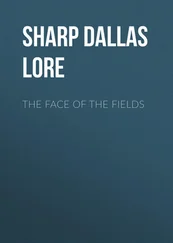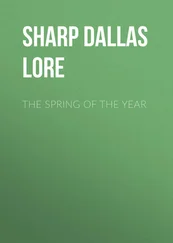Dallas Sharp - A Watcher in The Woods
Здесь есть возможность читать онлайн «Dallas Sharp - A Watcher in The Woods» — ознакомительный отрывок электронной книги совершенно бесплатно, а после прочтения отрывка купить полную версию. В некоторых случаях можно слушать аудио, скачать через торрент в формате fb2 и присутствует краткое содержание. Жанр: Природа и животные, foreign_antique, foreign_prose, на английском языке. Описание произведения, (предисловие) а так же отзывы посетителей доступны на портале библиотеки ЛибКат.
- Название:A Watcher in The Woods
- Автор:
- Жанр:
- Год:неизвестен
- ISBN:нет данных
- Рейтинг книги:5 / 5. Голосов: 1
-
Избранное:Добавить в избранное
- Отзывы:
-
Ваша оценка:
- 100
- 1
- 2
- 3
- 4
- 5
A Watcher in The Woods: краткое содержание, описание и аннотация
Предлагаем к чтению аннотацию, описание, краткое содержание или предисловие (зависит от того, что написал сам автор книги «A Watcher in The Woods»). Если вы не нашли необходимую информацию о книге — напишите в комментариях, мы постараемся отыскать её.
A Watcher in The Woods — читать онлайн ознакомительный отрывок
Ниже представлен текст книги, разбитый по страницам. Система сохранения места последней прочитанной страницы, позволяет с удобством читать онлайн бесплатно книгу «A Watcher in The Woods», без необходимости каждый раз заново искать на чём Вы остановились. Поставьте закладку, и сможете в любой момент перейти на страницу, на которой закончили чтение.
Интервал:
Закладка:
Dallas Lore Sharp
A Watcher in The Woods
BIRDS' WINTER BEDS
A storm had been raging from the northeast all day. Toward evening the wind strengthened to a gale, and the fine, icy snow swirled and drifted over the frozen fields.
I lay a long time listening to the wild symphony of the winds, thankful for the roof over my head, and wondering how the hungry, homeless creatures out of doors would pass the night. Where do the birds sleep such nights as this? Where in this bitter cold, this darkness and storm, will they make their beds? The lark that broke from the snow at my feet as I crossed the pasture this afternoon —
What comes o' thee?
Whar wilt thou cow'r thy chittering wing,
An' close thy e'e?
The storm grew fiercer; the wind roared through the big pines by the side of the house and swept hoarsely on across the fields; the pines shivered and groaned, and their long limbs scraped over the shingles above me as if feeling with frozen fingers for a way in; the windows rattled, the cracks and corners of the old farm-house shrieked, and a long, thin line of snow sifted in from beneath the window across the garret floor. I fancied these sounds of the storm were the voices of freezing birds, crying to be taken in from the cold. Once I thought I heard a thud against the window, a sound heavier than the rattle of the snow. Something seemed to be beating at the glass. It might be a bird. I got out of bed to look; but there was only the ghostly face of the snow pressed against the panes, half-way to the window's top. I imagined that I heard the thud again; but, while listening, fell asleep and dreamed that my window was frozen fast, and that all the birds in the world were knocking at it, trying to get in out of the night and storm.
The fields lay pure and white and flooded with sunshine when I awoke. Jumping out of bed, I ran to the window, and saw a dark object on the sill outside. I raised the sash, and there, close against the glass, were two quails – frozen stiff in the snow. It was they I heard the night before fluttering at the window. The ground had been covered deep with snow for several days, and at last, driven by hunger and cold from the fields, they saw my light, and sought shelter from the storm and a bed for the night with me.
Four others, evidently of the same covey, spent the night in the wagon-house, and in the morning helped themselves fearlessly to the chickens' breakfast. They roosted with the chickens several nights, but took to the fields again as soon as the snow began to melt.
It is easy to account for our winter birds during the day. Along near noon, when it is warm and bright, you will find the sparrows, chickadees, and goldfinches searching busily among the bushes and weeds for food, and the crows and jays scouring the fields. But what about them during the dark? Where do they pass the long winter nights?
Why, they have nests, you say. Yes, they had nests in the summer, and then, perhaps, one of the parent birds may be said to have slept in the nest during the weeks of incubation and rearing of the young. But nests are cradles, not beds, and are never used by even the young birds from the day they leave them. Muskrats build houses, foxes have holes, and squirrels sleep in true nests; but of the birds it can be said, "they have not where to lay their heads." They sleep upon their feet in the grass, in hollow trees, and among the branches; but, at best, such a bed is no more than a roost. A large part of the year this roost is new every night, so that the question of a sleeping-place during the winter is most serious.
The cheerful little goldfinches, that bend the dried ragweeds and grass-stalks down and scatter their chaff over the snow, sleep in the thick cedars and pines. These warm, close-limbed evergreens I have found to be the lodging-houses of many of the smaller winter birds – the fox-colored sparrow, snowbird, crossbill, and sometimes of the chickadee, though he usually tucks his little black cap under his wing in a woodpecker's hole.
The meadow-larks always roost upon the ground. They creep well under the grass, or, if the wind is high and it snows, they squat close to the ground behind a tuft of grass or thick bush and sleep while the cold white flakes fall about them. They are often covered before the morning; and when housed thus from the wind and hidden from prowling enemies, no bird could wish for a cozier, warmer, safer bed.
But what a lonely bed it is! Nothing seems so utterly homeless and solitary as a meadow-lark after the winter nightfall. In the middle of a wide, snow-covered pasture one will occasionally spring from under your feet, scattering the snow that covered him, and go whirring away through the dusk, lost instantly in the darkness – a single little life in the wild, bleak wilderness of winter fields!
Again, the grass is often a dangerous bed. On the day before the great March blizzard of 1888, the larks were whistling merrily from the fences, with just a touch of spring in their call. At noon I noted no signs of storm, but by four o'clock – an hour earlier than usual – the larks had disappeared. They rose here and there from the grass as I crossed the fields, not as they do when feeding, far ahead of me, but close to my feet. They had gone to bed. By early evening the snow began to fall, and for two days continued furiously.
A week later, when the deep drifts melted, I found several larks that had perished from cold or starvation or had smothered under the weight of snow.
There is something of awe in the thought of a bird nestling close beneath a snow-laden bush in a broad meadow, or clinging fast to a limb in the swaying top of some tall tree, rocked in its great arms through the night by a winter gale. All trees, even the pines and cedars, are fearfully exposed sleeping-places, and death from cold is not infrequent among the birds that take beds in them.
The pine barrens, and especially certain pine clumps along Cohansey Creek and at the head of Cubby Hollow, used to be famous crow-roosts. Thousands of the birds, a few years ago, frequented these pieces of wood in the winter. About the middle of the afternoon, during the severest weather, they begin to fly over to the roost at the head of the Hollow, coming in from the surrounding fields, some of them from miles away, where they have been foraging all day for food. You can tell the character of the weather by the manner of their flight. In the fall and spring they went over cawing, chasing each other and performing in the air; they were happy, and life was as abundant as the spring promise or the autumn fullness everywhere. But in January the land is bare and hard, and life correspondingly lean and cheerless. You see it in their heavy, dispirited flight; all their spring joyousness is gone; they pass over silent and somber, reluctant to leave the fields, and fearful of the night. There is not a croak as they settle among the pines – scores, sometimes hundreds of them, in a single tree.
Here, in the swaying tops, amid the heavy roar of the winds, they sleep. You need have no fear of waking them as you steal through the shadows beneath the trees. The thick mat of needles or the sifted snow muffles your footfalls; and the winds still the breaking branches and snapping twigs. What a bed in a winter storm! The sky is just light enough for you to distinguish the dim outlines of the sleepers as they rock in the waves of the dark green that rise and fall above you; the trees moan, the branches shiver and creak, and high above all, around and beneath you, filling the recesses of the dark wood rolls the volume of the storm.
But the crows sleep on, however high the winds. They sit close to the branches, that the feathers may cover their clinging feet; they tuck their heads beneath their wing-coverts, thus protecting the whole body, except one side of the head, which the feathers of the wing cannot quite shelter. This leaves an eye exposed, and this eye, like the heel of Achilles, proves to be the one vulnerable spot. It freezes in very severe weather, causing a slow, painful death. In the morning, after an unusually cold night, you can find dozens of crows flapping piteously about in the trees of the roost and upon the ground, with frozen eyes. In January, 1895, I saw very many of them along the Hollow, blind in one eye or in both eyes, dying of pain and starvation. It was pitiful to see their sufferings. The snow in places was sprinkled with their broken feathers, and with pine-needles which they had plucked off and tried to eat. Nothing could be done for the poor things. I have tried time and again to doctor them; but they were sure to die in the end.
Читать дальшеИнтервал:
Закладка:
Похожие книги на «A Watcher in The Woods»
Представляем Вашему вниманию похожие книги на «A Watcher in The Woods» списком для выбора. Мы отобрали схожую по названию и смыслу литературу в надежде предоставить читателям больше вариантов отыскать новые, интересные, ещё непрочитанные произведения.
Обсуждение, отзывы о книге «A Watcher in The Woods» и просто собственные мнения читателей. Оставьте ваши комментарии, напишите, что Вы думаете о произведении, его смысле или главных героях. Укажите что конкретно понравилось, а что нет, и почему Вы так считаете.












